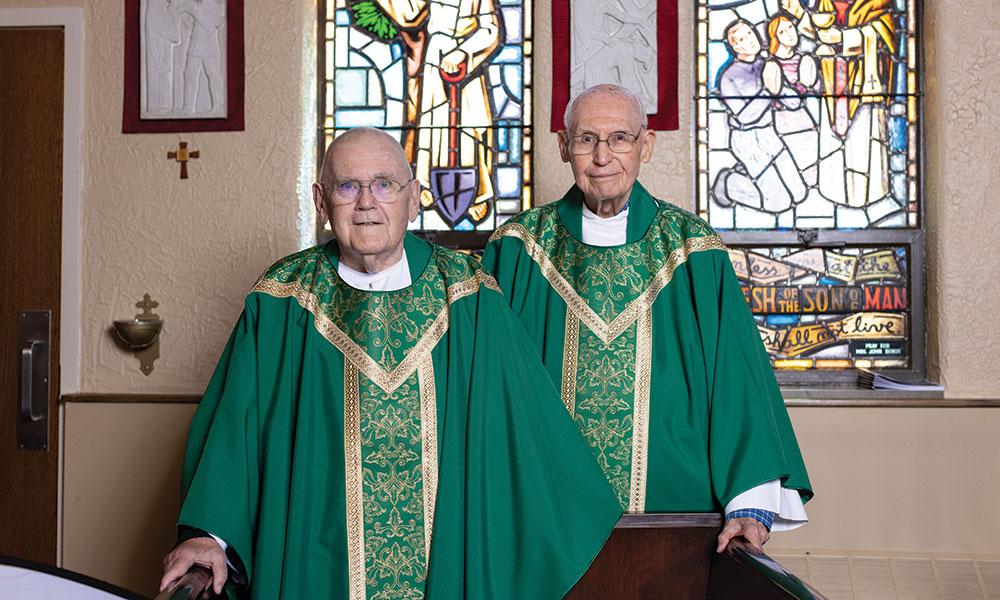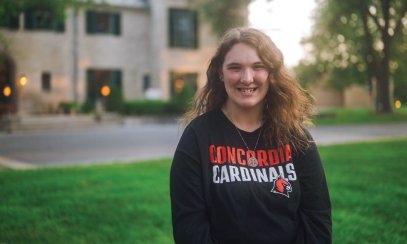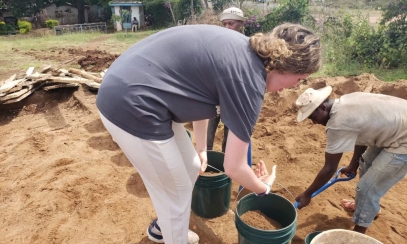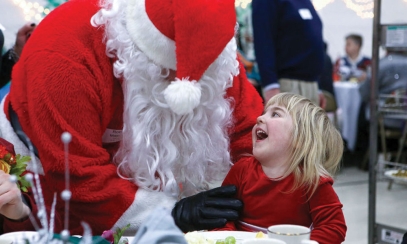
Fatherhood at its Finest
Looking back over their combined decades of priesthood, Monsignors Michael Murphy and Robert Lunsford share their recollections, insights and advice for the newly ordained.
Looking back over their combined decades of priesthood, Monsignors Michael Murphy and Robert Lunsford share their recollections, insights and advice for the newly ordained.
It’s a quiet spring afternoon at the St. Francis Retreat Center. Although some people have already left for the day, there’s a small sitting room that’s still occupied. Two retired priests chat comfortably, the edges of their lifelong friendship and years of service to the Lord rubbed as smooth as sea glass.
It’s a quiet spring afternoon at the St. Francis Retreat Center. Although some people have already left for the day, there’s a small sitting room that’s still occupied. Two retired priests chat comfortably, the edges of their lifelong friendship and years of service to the Lord rubbed as smooth as sea glass.
On this particular day, Msgrs. Lunsford and Murphy have agreed to hold that sea glass up to the light.
“I was 11 years old when I knew I wanted to be a priest,” Lunsford says. “It was a November day, I was lying on the rug near the front door reading a letter from my grandmother. I knew the Lord wanted me to be a priest. I said yes, and I've never had any regrets or any doubts. It can be difficult and it can be challenging at times, but I can honestly say I have never been unhappy as a priest.”
Murphy also was young when he received God’s call.
“I had an older cousin who wanted to be a priest, and we would play Mass at his house, which is when I began to think about it,” he says. “But it wasn’t until high school that I decided I would go to the seminary. My family were all very supportive, and several of us pursued vocations.”
Both men received their early formation in the Cathedral parish—just six years apart (“He was a grand high poo-bah up there in high school, and I was just a little snot in sixth grade,” Murphy says)—and were educated at Sacred Heart Seminary in Detroit. Their jobs took them across the diocese, which was first formed in 1937.
Their work took them all across the diocese, from parishes in the Flint, Lansing, and Ann Arbor areas to the diocesan education office and curia.
And, as a result, they’ve seen some things.
“We’ve been part of an extraordinary group of priests,” Murphy says. “We've built a community and we've kept that community together. And I think that's a real tribute to our bishops and the clergy because you have to work at that.”
And that remains true, Lunsford says.
“Back in the seminary days, Lansing had the reputation of having a cohesive presbyterate. A real fraternity. And the priests have built on that over the years.”
It’s a fraternity that sees priests from the diocese through their darkest days, and helps them enjoy the best ones.
“Those friendships, it's invaluable and they're lifelong friendships,” Lunsford says. “The two of us used to get together with our fellow priest, Father Ray Rademacher, at St. Thomas on Sunday evenings. We'd share a meal and what was going on, and you had close friendships and you'd turn to each other.”
Today’s priests have small support groups to help them when the work is difficult. And, indeed, the work often brings extraordinary challenges.
“The accidents,” Murphy says. “I remember those first. There was one years ago, where only a young girl survived a huge accident on the turnpike that killed six members of her family. The procession was five miles long, and I had to take her to each of the caskets. We identified who was in the casket, and then we said the prayers for the deceased and we did that six times. I thought it was never going to end. Days like those are the hardest days.”
Of course, there are other, more long-term leadership challenges with which priests must contend.
“Years ago, I was responsible for religious education, kindergarten through adult and CCD, and it was right after the Second Vatican Council,” Lunsford says. “We were striving to be faithful in teaching and proclaiming the faith when everything appeared to be up for grabs. So there was tension there and a real struggle over the years.”
Lunsford notes these types of issues cause real, lasting challenges for parishioners and take time to heal.
“I think back to when I went to St. Thomas in Ann Arbor and I learned, the high school either had to close or become a regional institution. And the parish was split right down the middle,” he says. “It took a number of months to resolve that, and then it took almost five years to heal the wounds in the parish. So those early days were quite painful, but then the healing was accomplished and great things went on.”
For every bad day, however, there are some amazing experiences to add balance to life as a priest.
“I think one of my most memorable days was when I was at St. Thomas in Ann Arbor. A young man, a sophomore in high school, was peddling papers and was shot and I got the call,” Lunsford says. “He was at U of M hospital in the children's unit from that day, August 15th, to the next spring. And it was problematic whether he would live from day to day. And after this last surgery, they were down because the surgery didn’t work as expected and they felt it would be too much for him.
“At the Sunday Masses, I had asked the people to pray and fast. Then, after the surgery, I heard from the parents that the boy had telephoned them himself the night before, right after the surgery when he was back in his room. And from that day forward, he improved. He is now a priest.”
Murphy says the affirmation of other professionals has been helpful in coping with the tragedies and losses he’s experienced as a priest.
“It helps to know you've done something good and you've led people to not only look at the negative, but to also look forward,” he says. “And I remember the psychologist at St. Thomas Aquinas saying, ‘You don't let them just sit there and wallow in their grief and so forth. You challenge them to get up and move on. And this is a matter of faith and to strive.’ And that's what I tried to do.”
Indeed, it is this and other responsibilities that help Lunsford and Murphy feel like they have been effective fathers to those in their pastoral care over the years.
“We have ongoing care and concern for people in our parishes and schools, just as fathers do for their families,” Lunsford says. ”One of the delights for me was going into classrooms and just asking the kids questions about what they were learning or about their faith. And as a result of that, there are times when I can remember kids coming to me seeking counseling and everything, and you really were doing fatherly things with them. But in a less obvious sense, when you're ministering to people who are hurting at funerals or mourning or the sick, that dimension is there. And it's not something you consciously are aware of or reflect on, but it's there.”
Murphy agrees.
“To me, that's pastoring and that's what a pastor does—and what a father does as well,” he says. “A good father challenges, he consoles and counsels.”
Both priests note that the Diocese of Lansing has been fortunate to experience leadership from their own special father figures over the years.
“We've had the right bishops at the right time,” Lunsford says. “Bishop Albers, our first bishop, was a builder, and there were any number of Catholic schools and parishes instituted under his leadership. He was followed by Bishop Zaleski, who took over in December of '65, just at the end of the council. He was a brilliant scripture scholar and he really instituted plans for educating the priests and the faithful in Vatican II and trying to implement it as intended. He was followed by Bishop Povish, who was a pastor and had years and years as a pastor and was a pastor not just to the diocese, but to the priests of the diocese. That cohesiveness again, followed by Bishop Mengeling, who we used to call the evangelist.
“And now we have Bishop Boyea. Each one has been the perfect bishop for the time, and we look forward to a bright future for the diocese.”
“Pray.”
That’s the advice Monsignors Lunsford and Murphy have for a new priest just starting with his first parish.
“You've got to be a man of prayer or otherwise you're going to get lost,” Murphy says. “You've got to take care of your spiritual life. If you don't, this job will eat you alive.”
While brother priests do a great job of caring for one another across the Diocese of Lansing, no priest—and no father of any family, parish or organization—can be successful for long without the Lord.
“That's the other part of the equation. We go to each other, but more important than that, we go to the Lord,” Lunsford says. “Prayer is our umbilical cord to the Lord, and the two go hand in hand. It’s how we’re nourished, and how we continue to nourish others.”



